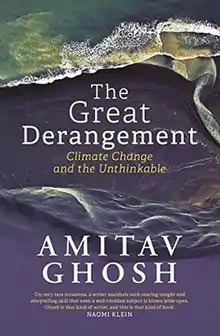The Great Derangement: Climate Change and the Unthinkable
The Great Derangement: Climate Change and the Unthinkable is a non-fiction book addressing climate change by Indian writer Amitav Ghosh published in 2016.[1]
 First edition | |
| Author | Amitav Ghosh |
|---|---|
| Country | India |
| Language | English |
| Genre | Non-fiction |
| Publisher | Penguin Books |
Publication date | 2016 |
| Media type | Print (hardback) |
| ISBN | 9789386057433 |
| Preceded by | Incendiary Circumstances |
Synopsis
The book is composed of three parts: Part I, titled Stories, Part II, History, and Part III, Politics.[2] The first part--Stories--explores why the modern novel struggles as an art form to describe and grapple with the concept of climate change. To understand this shortcoming, Ghosh highlights the role of the uncanny. In the second section--History--Ghosh highlights the role of colonialism in the climate crisis. With examples ranging from Miami to Mumbai to New York, Ghosh explores why urban planning deviated and deviates from the indigenous multigenerational knowledge that compelled cultures to build away from the ocean. In the final section--Politics--Ghosh notes that activists who single out capitalism as the systemic driver of climate change miss an important element: imperialism. Ghosh describes how writers and artists increased their engagement with political movements at the same time as industrial activities intensified. Ghosh ties these three sections together with a comparison between the Paris agreement and Pope Francis's 2015 encyclical on climate change'.[3]
Reviews
In his review for The Guardian, Pankaj Mishra says, "How such 'progress' changes the global environment is revealed, along with other true faces of easternisation, by Ghosh in his short but broad-ranging and consistently stimulating indictment of our era of the 'great derangement'". Though Mishra notes that "Ghosh’s account of literary omissions can occasionally feel selective....He doesn’t linger long enough on the technical difficulties of incorporating climate change into artistic practice, or whether many novelists haven’t already described its consequences, such as civil war and ethnic cleansing," he describes "his indictment of a complacent avant gardism in the arts [as] original and subtle."[4]
In a review for the Journal of International Affairs, Astha Ummat gives a strong positive review for The Great Derangement, noting that Ghosh "supplements his thoughts with hard facts and figures" and "maintains the fine balance between technical complexities of the science of climate change and how climate change can in fact also be seen as a crisis of culture." Further, Ummat finds very strong Ghosh's criticism of the 'Politics of Sincerity,' a type of skeptical criticism based on individual lifestyle choices in the face of systemic problems.[3]
- Raghu Karnad, 'Why We Do Not Hear the Waters: Amitav Ghosh’s Great Derangement', The Wire (12 July 2016)
References
- http://www.amitavghosh.com/index.html
- "Book Review: The Great Derangement: Climate Change and the Unthinkable by Amitav Ghosh". LSE Review of Books. 2017-07-20. Retrieved 2018-03-14.
- Ummat, Astha; Ghosh, Amitav (2018). "The Great Derangement: Climate Change and the Unthinkable Review". Journal of International Affairs. 71 (2): 143–145. ISSN 0022-197X. JSTOR 26552340.
- Mishra, Pankaj (3 November 2016). "Easternisation by Gideon Rachman and The Great Derangement by Amitav Ghosh – review". The Guardian. Retrieved 27 April 2020.